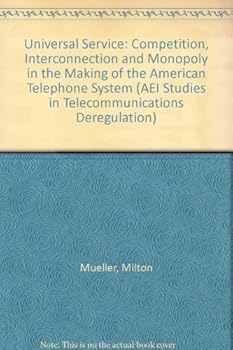Universal Service: Competition, Interconnection, and Monopoly in the Making of the American Telephone System
Revisits the critical period of unbridled competition between the Bell System and independent telephone companies early in the twenty-first century. This description may be from another edition of this product.
Format:Hardcover
Language:English
ISBN:026213327X
ISBN13:9780262133272
Release Date:January 1996
Publisher:MIT Press (MA)
Length:213 Pages
Weight:1.15 lbs.
Dimensions:0.9" x 6.3" x 9.3"
Customer Reviews
3 ratings
An Excellent Book
Published by Thriftbooks.com User , 18 years ago
An excellent book that explores the myth of telecommunications policy. A problem in telecommunications policy is that the regulatory approaches have been sufficiently long lived that those who regulate today were not around when the regulatory policy was established. We have lived so long with regulatory approach that we have lost site of regulatory policy. As we today address, should a VoIP phone be regulated like a Verizon POTS phone, the answer is normally "Yes" because "like things should be regulated the same." This articulates a regulatory approach devoid of comprehension as to why a Verizon POTS phone was ever regulated in the first place. Milton Mueller takes us there and explores through his dissection of Universal Service what first brought about these policies, who sought them, and what gain they thought might be achieved through regulation. Today's universal service (98% of all americans have phones) is a grand achievement, but it is a far cry from what AT & T meant by "universal service" in 1908.
Extraordinary
Published by Thriftbooks.com User , 24 years ago
In this crisply written mix of history and clear theory, Mueller retells the history of early competition in telephony -- and of the role of regulation in making the AT & T monopoly. The book brings to life a completely forgotten period, where telephones were like computer operating systems today -- competing yet incompatible. Not every phone could be called from every phone, and this fact, Mueller convincingly argues, pushed competition in telephone penetration.The book also is convincing in its account of the reconstruction of the meaning of the word "universal service" which was brought about, Mueller argues, by AT & T revisionism in the 1970s. The original meaning was simply that any phone would be able to call any phone; the modern meaning (that some service subsidizes other service) was a construction of a late monopoly trying to defend itself.The book suggests wonderful (if under developed) parallels with the story of competition in modern operating systems. And it offers some important skepticism about the 1996 Telecommunications Act.
Must reading in telecommunications policy
Published by Thriftbooks.com User , 27 years ago
A fascinating account of telephone competition in the early 1900s, when the competing telephone systems did not connect. Mueller's analysis of the experience of a fragmented telecommunications infrastructure--and the decision to put an end to it in the name of "universal service"--has important implications for Internet and telecom development today. John Crook





